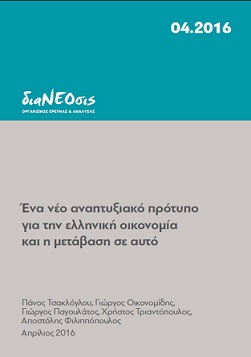Morys Matthias, (2016), “Greece in a monetary union: Lessons from 100 years of exchange rate experience, 1841-1939”, Voxeu, 10 Μαΐου The first century of modern Greek monetary history has striking parallels to the country’s current crisis, from repeated cycles of entry and exit from the dominant fixed exchange rate system, to government debt built-up and default, to financial supervision by West European countries. This column compares these two episodes in Greece’s monetary …Read More
Where did the Greek bailout money go?
Rocholl, J., and A. Stahmer (2016), “Where did the Greek bailout money go?”, ESMT White Paper No. WP–16–02 This paper analyzes the flow of money for the different Greek bailout funds and concentrates on two key questions. First, where did the money come from? Second, where did the money go to? Finally, the paper discusses the findings in a broader context and derives policy implications. Figure 1 presents the main …Read More
Is Greek public debt unsustainable?
Darvas, Zsolt, Hutl, Pia, (2016), “Is Greek public debt unsustainable?”, Bruegel, 7 Μαϊου Greek public debt does not look sustainable if the country has to return to market borrowing at the end of the third bail-out programme, but could be sustainable if preferential ESM funding continues in the long-term. Our advice is to offer hope for Greece in the form of delayed fiscal adjustment toward a target of 2.5% of …Read More
Η έξοδος των ελληνικών επιχειρήσεων
Endeavor Greece, (2016), “Η έξοδος των ελληνικών επιχειρήσεων”, Endeavor, 5 Απριλίου Η Endeavor Greece, διεθνής μη κερδοσκοπικός οργανισμός στήριξης της επιχειρηματικότητας, καταγράφει την τάση των ελληνικών επιχειρήσεων για μεταφορά της έδρας ή μέρους της δραστηριότητάς τους στο εξωτερικό. Η έρευνα διεξήχθη σε δείγμα 300 επιλεγμένων επιχειρήσεων διαφόρων κλάδων και μεγεθών κατά το διάστημα 23-31 Μαρτίου. Σύμφωνα με τα ευρήματα της έρευνας, 39% των επιχειρήσεων εξετάζουν το ενδεχόμενο μεταφοράς της έδρας τους …Read More
The Greek Tragedy And Its Solution
Bernegger,Michael, (2016), “The Greek Tragedy And Its Solution”, Social Europe OP 8, Ιούνιος 2015 Ostensibly, the Greek crisis is about sovereign debt. It appears to result from a too expansionary fiscal policy and a loss in price competitiveness since the launch of the euro. This competitive weakness, it is claimed, can be attributed to an excessive rise in labour costs in relation to anaemic macroeconomic productivity growth. In reality, the …Read More
How to Handle the Crisis in Greece? Empirical Evidence Based on a Survey of Economics Experts
Potrafke,Niklas, Reischmann, Markus (2016), “How to Handle the Crisis in Greece? Empirical Evidence Based on a Survey of Economics Experts”, CESifo Working Paper No. 5860, Απρίλιος 2016 We asked experts from 113 countries polled by the CESifo World Economic Survey for their opinions on how to handle the crisis in Greece. 61.9% of the experts surveyed were not in favour of Greece exiting the Eurozone in the course of the negotiations held …Read More
Time for Debt Reduction in Greece
El-Arian, Mohamed A., (2016), “Time for Debt Reduction in Greece”, Project Syndicate, 22 Απριλίου Once again, Greece is at an inflection point. With its cash balances severely stressed, it seems unlikely to be able to pay the cascading debt payments that are falling due over the next few months. So yet another round of contentious and protracted discussions with its creditors is underway – one that may well produce yet another …Read More
As European Central Bank Convenes, How Well Has Maestro Mario Performed?
Spellman, James D. , (2016), “As European Central Bank Convenes, How Well Has Maestro Mario Performed?”, The European Institute, Μάρτιος 2016 Euphoria in financial markets can burn off as fast as fireworks, an explosive flare-up and then, poof, gone. Many investors are wondering if the unprecedented initiatives by the European Central Bank, including negative interest rates, may be just like that, a cascade of fleeting embers. Others, though, think the restructuring …Read More
Ένα νέο αναπτυξιακό πρότυπο για την ελληνική οικονομία και η μετάβαση σε αυτό
Τσακλόγλου, Πάνος, Οικονομίδης, Γιώργος, Παγουλάτος, Γιώργος, Τριαντόπουλος, Χρήστος, Φιλιππόπουλος, Αποστόλης, (2016), “Ένα νέο αναπτυξιακό πρότυπο για την ελληνική οικονομία και η μετάβαση σε αυτό”, ΔιαΝΕΟσις, Απρίλιος Σύμφωνα με στοιχεία της Παγκόσμιας Τράπεζας, ο πληθυσμός της Ελλάδας αποτελεί περίπου το 0,15% του πληθυσμού του πλανήτη και το ελληνικό ΑΕΠ λιγότερο από το 0,3% του παγκόσμιου ΑΕΠ, αν αυτό μετρηθεί σε ονομαστικούς όρους, ή ακόμη λιγότερο, αν μετρηθεί σε όρους πραγματικής αγοραστικής δύναμης. Παρ’ όλα αυτά, η …Read More
Η ανταποδοτικότητα των συντάξεων στην Ελλάδα
Λεβέντη, Χρύσα, Ματσαγγάνης, Μάνος, (2016), “Η ανταποδοτικότητα των συντάξεων στην Ελλάδα”, Ομάδα Ανάλυσης Δημόσιας Πολιτικής Οικονομικό Πανεπιστήμιο Αθηνών, Ενημερωτικό Δελτίο 9/2016 Η εργασία αυτή εξετάζει ένα κρίσιμο ζήτημα δημόσιας πολιτικής: Οι συντάξεις που εισπράττουν οι σημερινοί συνταξιούχοι έχουν “πληρωθεί” από τις εισφορές που είχαν καταβάλει όσο εργάζονταν οι ίδιοι οι ασφαλισμένοι (και οι εργοδότες τους); Σε ποιο ακριβώς βαθμό; Είναι “υπερ-ανταποδοτικές” (δηλ. υψηλότερες από ό,τι αντιστοιχεί στις εισφορές που καταβλήθηκαν); Ή είναι, αντίθετα, …Read More





